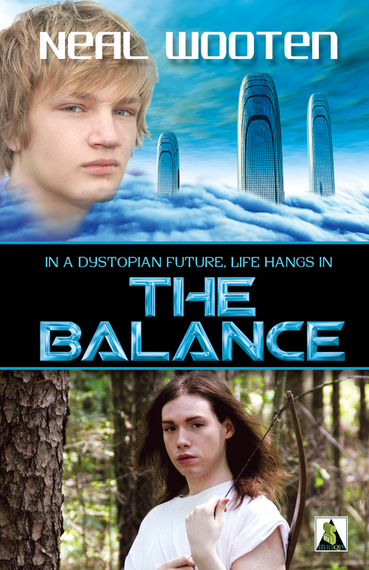Neal Wooten is the author of a new and exciting young adult novel titled The Balance. In the distant future, three classes of people live in a precarious and ultimately untenable balance. the Children and the Scavs (who call themselves the Spirit People), live on the surface of Earth in a land called Canus and are mortal enemies. The Fathers live in a utopian, although emotionless, city in the sky.
The story is told through the eyes of a nineteen year old young man, Piri, who falls quite literally to Earth and is rescued by Niko, a nineteen year old male who is a part of the Children tribe. Piri, who has led an emotionless life in the sky, is tossed into the pain and difficulty of life on the surface. But, as his feelings grow for Niko and Niko's family, he experiences love and joy for the first time in his life. It is a captivating and adventurous love story where Piri will do anything to protect his new family, including disrupting the balance.
I had the opportunity to speak with Neal about his new book, which is published by Bold Strokes Books and will be released on April 15th.
At the heart of The Balance is a love story between Piri and Niko and it's a same sex relationship. What prompted you to create this romance?
The original manuscript began with the lead character being a girl, but there were many same-sex couples in the story. It was the advice of two literary agents that convinced me that it might be a better story if it was written from a male's perspective, hence adding one more same-sex couple. They were right.
The world you create in the future is populated by three groups, the Father's, the Children and the Scavs. How did you arrive at these three groups?
It is the evolution of the three social classes: the poor, middle class, and the wealthiest. This is just an advanced form of the separation that now exists. The rich build their homes away from the other classes, and the poorest citizens literally scavenge for survival.
What was the most difficult scene for you to write and why?
The scenes where Piri is thrown into society on the surface. His lack of emotions, a normal trait for the city dwellers, made it difficult to portray him as likable and interesting. And whereas likability might not be a requisite for readers to associate with a book's character, being interesting is very important.
Which character do you most identify with and why?
I am probably most like Curz, the old loco man, except for him wanting to be alone. I like having people around, but his sense of humor came directly from me.
What did you edit out of the book?
Tons. The story originally revolved around the moon receding too far from the earth. I completely started over several times throwing entire chapters away. After six years, this was the final story and the original premise became a short story titled "Veggie Moon," which was published by a British publisher in their "Looking Landward" anthology.
There is a scene between Niko and Piri that makes me cry. Which scene fills you with the most emotion? (Don't give away the scene!)
It is the later scene with Payo, a simple but lovable character. I cried like a baby when I wrote it, and every 25 or so times I've proofread it. Even knowing what's coming, I can't control it.
The children speak a mix of English and Spanish and live on the surface of Earth in the future. Did you have a particular city in mind when writing this?
There are also Canadian words and phrases. No actual cities remain on the surface, but it mentions the Great Lakes, the Smoky Mountains, and the Rocky Mountains. The land of Canus (which is derived from Canada and the U.S.), is somewhere in the middle of this continent, maybe on the old border of both countries, what's left from rising waters.
You published this book through Bold Strokes Books, a publisher that specializes in LGBT literature. Was this your first time publishing there and how did you find the process?
This was my first time. This was my first novel that classifies as a LGBT book. When I finished it, I sent it to every LGBT publisher I could find, and it was accepted by all of them. I chose Bold Strokes Books because they have much more to offer in terms of reputation and distribution. The process has been a long yet devoted one. They have their stuff together and after 15 months, we're almost there.
If you could highlight one message that this book delivers, which would it be?
Labels are not real. The three subspecies in the book are all just people. Like today, there should be no labels, but as a species, we use labels to not only identify ourselves, but to separate others. In the future presented by The Balance, there are no gay people, no straight people, only people.
Will there be a sequel?
Yes, it will be a trilogy. I am already writing the first sequel, where we discover, among other things, what manner of creature resides in the northern forest.
In your future world, same sex relationships are accepted like any other relationship. How long do you think it will take until this becomes the norm in our society?
That's hard to say. For every inch gained in this country, we sometimes take giant steps backward. I hope it is in my lifetime. I hope to have young people look at me when I'm old and gray and wonder, "What was wrong with you people back then?"
Follow Neal Wooten on Twitter www.twitter.com/NealWooten

